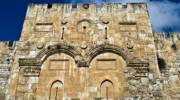ON the day after Passover, Moroccan Jews around the world celebrate the Mimouna holiday, in order to mark the beginning of spring and the ability to once again eat Hametz (leavened bread products). It is a day full of celebration and joy, where women wear traditional Moroccan dresses, men dress in traditional Moroccan fez hats, Moroccan music is played and every one enjoys various foods.
There are no agreements on the origins of the holiday. Some believe that the Mimouna holiday was named after Maimon, the father of Rambam, and marks the day of his birth, while others assert that the holiday was initiated in order to persuade a Jewish demon named Maimon to let the crops flourish. Another theory claims that Mimouna derives from the Hebrew word Emunah, meaning faith. People who believe in this theory state that the Jewish people will be redeemed and the messianic age will be ushered into existence on this holiday.
Regardless of the origin of the holiday, Moroccan Jews celebrate this day by baking a variety of sweet things. It is the Moroccan pastry holiday, par excellence! Different Moroccan Jewish communities have different traditions for the holiday. Some Moroccan Jews make a sweet pancake called mufleta, which is served with honey, butter, and unique homemade jams, which Moroccan woman work to prepare throughout the year. These jams can include eggplants, lemons, oranges, tomatoes, and a variety of other fruits and vegetables.
Other Moroccan Jews have a tradition of making couscous mixed with either warm milk or yogurt. This dish is known as birkouksh. Yet, still other Moroccan Jews make a special cream called jaban, which is made with almonds and eggs. Naturally, all Moroccan Jews, regardless where they are from within Morocco, make a variety of cookies. Some of the cookies look like various fruits, vegetables, and flowers, yet are sweet and eatable. Other cookies are made with chocolate, yet still others are made with sesame, almonds, and a variety of other tasty things.
The day after Moroccan Jews eat all of these sweets, in Israel, a BBQ is usually held. At these BBQs, Moroccan Jews eat homemade pita breads, chicken kebabs, beef kebabs, steaks, and also a variety of other expensive meats, such as brain. The Moroccan Jewish women also usually prepare a variety of salads, such as green cabbage salad, purple cabbage salad, egg salad, Israeli salad, avocado salad, preserved olives, etc. The BBQ usually lasts the entire day and includes all of the family, as well as friends. In Morocco itself, families would traditionally visit one another on this day, since it was often difficult for such visits to occur during Passover itself due to varying levels of kashrut observance.
Since most of the Moroccan Jewish community made Aliyah to Israel, Mimouna has become a national holiday within Israel as well and has been adopted by other Jewish communities, most of them Mizrahim. Politicians frequently make visits to various Mimouna celebrations during Mimouna, in order to earn respect from the Moroccan Jewish community. Prime Minister Benjamin Netanyahu, for example, visited a Mimouna celebration in Or Akiva, where he proclaimed, “We are moving from matzah and marror to mufleta and honey.” Indeed, it is a time of happiness and great fun!
By Rachel Avraham
Click ‘LIKE’ if you would like to celebrate Mimouna in Israel!
Do You Love Israel? Make a Donation - Show Your Support!
Donate to vital charities that help protect Israeli citizens and inspire millions around the world to support Israel too!
Now more than ever, Israel needs your help to fight and win the war -- including on the battlefield of public opinion.
Antisemitism, anti-Israel bias and boycotts are out of control. Israel's enemies are inciting terror and violence against innocent Israelis and Jews around the world. Help us fight back!






















